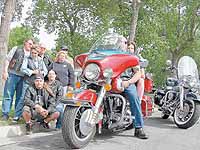| BACA members planning the big summer gathering in Price include Nick Pantalakis and Brenda Haycock on the bike, along with Chris and Katherine Cahoon, Tom and Caroline Barrington, Karl Kraync, Lisa and Travis Burge, and Tommy Jones. |
Clad in leather jackets and chaps, tatoos and piecings they rolled into the parking lot on their Harley’s, not to cause trouble, but to attend a BACA meeting. BACA stands for Bikers Against Child Abuse and the local group has been making a difference in Carbon County.
One of eight BACA groups in Utah, the group offers children a brother and sisterhood of protection, family and strength.
In BACA, abused children find the extra energy and companionship needed while they face their abusers. These men and women offer a haven for kids who face unspeakable terror and extend their intimidating image as a shelter to children as they deal with matters no person should.
According to Nick Pantalakis, president, the local chapter of BACA is hosting a state picnic June 28 in Washington Park in Price. Locally the group has eight active members.
BACA began in Utah in 1995 and was incorporated in 1996 by JP “Chief” Lilly, a former instructor at BYU and licensed clinical social worker. He realized that predators of children were still having their way with their victims after work with a therapist. Children spoke to Chief about threats from their abusers and their fear to face what they had to alone.
Direct quotes Chief heard included, “If you tell what happened, I will kill you, your parents and your dog.” “I have a secret tunnel into your house and if you tell what happened, I will sneak into your house and kill your family.” “If you tell what happened, I will kill your little sister,” according to BACA’s web site.
Chief started BACA because he saw a need for protection and recognized that the strong loyalty and commitment of bikers could be extended to those who could not help themselves.
Pantalakis says that only a small number of children actually come forward. Reported cases in eastern Utah in 2002 include 138 victims of sexual abuse, 29 victims of physical abuse, and 63 other cases which range from general, severe, chronic and serious. Pantalakis says that kids who come forward are heros, “they are doing something about a major problem that affects so many children.”
The group exists as a body of bikers to empower children to not feel afraid of the world in which they live. “We stand ready to lend support to our wounded friends by involving them with an established, united organization,” continued Pantalakis.
All the members of the organization are fingerprinted and a background check is run with the National Crime Information Center.
Pantalakis says that a member must ride with a chapter for a year before they are given a patch.
| Tough-image bikers also protectors of children |
The patch is something given to trusted BACA members and the children they protect. A child is told never to trust a biker unless he is she is wearing the big BACA patch. It is two patch-wearing members who are assigned to a child in the BACA introductory video. This contact with a child from any member of BACA comes only after a therapist informs the legal guardians or parents of an abused child about BACA, who can then contact BACA for support for their child.
BACA will never come to an abused child to offer their love and support unless a parent or guardian has asked them to and the case has been validated.
When initial contact happens, the entire chapter will ride to the child’s house, where love, gifts, and a vest with a child’s BACA patch is presented to the victim. The whole group then surrounds the child with motorcycles and takes them on a ride around town.
For the next three months, at least once a month, the entire chapter will visit the child, with the two assigned members visiting and aiding whenever necessary, whether that includes escorting them to court or offering protection.
Over the years BACA has learned about habits of predators or abusers. Usually it’s someone within the family structure. Pantalakis says that some statistics indicate that as high a 90 percent of abusers are someone the child knows and a high percentage of these are relatives. Child abusers come from all backgrounds and cross all economic and social cultures. The Internet has been an incredible factor affecting child abuse, however Utah leads all states in Internet measures.
In addition to pledging their loyalty, BACA members also receive training. BACA members attract a wide-variety of participants and members. Their professions range from auto body repair, welder, a federal agent, city employees, and businessmen. BACA has a therapy fund set up so if families do not have the money for their child’s therapy, they will assist.
Pantalakis did point out that the group exists to support the child, not get involved in custody battles and the group does not condone violence.
The community is invited to attend the BACA picnic on June 28 as are local law enforcement officers. The group is expecting around 150 bikers in town for the celebration, which will include food, music, and games.
The hotline to reach BACA is 435-637-2236.

